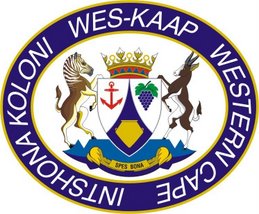 Today our Provincial Premier Ebrahim Rasool open the new session of the Western Cape Provincial Parliament.
Today our Provincial Premier Ebrahim Rasool open the new session of the Western Cape Provincial Parliament.A link to his opening speech will be posted here as soon as it is available on either the CapeGateway or the Provincial Legislature sites
The text of the Premier's State of the Province Speech
Below is an extract of the portion of the speech in which Premier Rasool addresses the impacts of climate change on the Western Cape Province and what action his government will be taking in the forthcoming year.
Further information on the Provincial Climate Change Programme is available on the climate change project website
I. Climate Change
The status quo report on climate change in the Western Cape that was commissioned by this government, reaches the following chilling conclusion:
The Western Cape faces the real possibility of socio-economic impoverishment as a result of climate change over and above the negative impact on poverty alleviation programmes.
If poverty will be exacerbated by global warming, then our task in the Western Cape is indeed becoming harder. Scientific evidence shows that the warming impact of climate change on the Western Cape is double the global average. Agriculture Minister Cobus Dowry warns that because our fruit trees require cold temperatures in winter, any further warming would potentially destroy this part of our agriculture economy.
We have invited here today, to participate in the opening of the legislature, representatives of those who are in the front line of the battle against the impact of global warming, battling the extremes of fires, floods, drought, desertification, risking their lives diving into floods waters or cleaning the high tension wires that carry electricity to us, or fight the fires on the ground or from helicopters.
We owe it to them and their families that all of us adapt our behaviours to climate change through coordinated action and lifestyle changes, while bigger decision-makers are persuaded not to continue on the path that has brought climate change to us.
In remaining faithful to our undertaking to be practical, government will act in the following priority areas:
• In a province that will experience even less rainfall and therefore greater water shortages, we will, towards 2014 intensify our search for alternative water sources such as aquafers, the recycling of waste water and the desalination of sea water. But, because 10% of our water is lost through leakages in pipes and taps, we will in 2007 launch a pilot programme in the West Coast District, where young people doing their National Youth Service in fixing leakages and saving water.
• To ensure food security and the protection of our agriculture, we are heartened that 50% of farmers have already shifted from the wasteful overhead irrigation method to the drip system. By 2010 our Agriculture Department will ensure that 70% of farmers have adopted water saving techniques towards a 100% target by 2014.
• With fires wreaking havoc and destroying both homes and vegetation, the urgency to eradicate alien vegetation has grown, necessitating the need to use the law against private property owners to remove alien vegetation. We will retain the 900, mostly women workers whose job it will be to remove alien vegetation, and towards 2010, Minister Essop will increase the number from 900.
• The cost of flooding in the Eden District due to climate change was R600 million. Some of these costs are avoidable and the Spatial Development Planning frameworks must now enforce respect for estuaries, river catchments and coastlines and the new flood lines that are being mapped. These will determine development and building permission, whether for luxury or informal purposes.
• The Western Cape has also borne the brunt of power outages, as our growing population and economy demand more electricity and our generation and distribution capacity has been found wanting. We salute the Cape Town Partnership and the Cape Chamber of Commerce for promoting retrofitting of the Central Business District with energy efficient technologies, following government's lead. Such demand-side measures must be complemented by new sources of energy. In the short-term our collaboration with Eskom will result in two Gas Powered stations coming on stream with a total of 1000 mega-watts of electricity in Mosselbay and Atlantis from the middle of this year already. Given our vulnerability to the energy crisis and power outages, we have very little choice but to welcome the announcement of a second nuclear power station in the Western Cape to stabilise our supply. However, we are now more determined to ensure that renewable sources of energy are implemented, and by 2014, 15% of our energy should be supplied through wind, solar, wave and natural gas sources.
 Out of interest the Provincial Parliament adopted a new logo today
Out of interest the Provincial Parliament adopted a new logo todayAll members received a gold medalion with the logo embossed on it at the opening function this morning



No comments:
Post a Comment